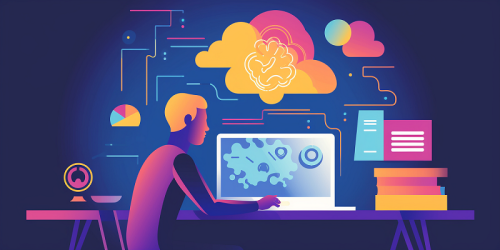
How AI Prompt Help Us in Daily Life and Work
AI prompts have become an integral part of the way we interact with artificial intelligence in our daily lives and professional activities. AI prompts are the instructions or questions that we provide to AI systems, enabling them to generate meaningful responses or perform specific tasks. These prompts help streamline workflows, enhance productivity, and simplify complex processes. Whether it's in personal use, professional tasks, or creative pursuits, AI prompts are making life easier and more efficient. Let’s explore how AI prompts are transforming our daily routines and work environments.
1. Personal Assistance and Productivity
AI prompts are widely used in virtual assistants like Siri, Alexa, and Google Assistant, allowing us to manage daily tasks more effectively. By providing simple voice or text prompts, users can access information, control smart devices, and even organize their schedules.
Task Management: Virtual assistants powered by AI respond to prompts like, "Set a reminder for my meeting at 10 AM" or "Add milk to my grocery list." This helps users manage their daily tasks effortlessly, allowing them to stay organized without manual effort.
Calendar and Event Scheduling: AI tools integrate with calendars to schedule events, send reminders, and keep track of appointments. By saying, "Schedule a meeting for Thursday at 2 PM," the AI handles the booking process automatically.
Information Retrieval: AI assistants can quickly pull up information based on prompts. For example, "What's the weather like today?" or "Give me the latest news," saves users time by providing immediate, relevant answers without searching manually.
Hands-Free Navigation: AI prompts help us navigate the world, whether it's asking for directions, estimating travel times, or finding local businesses. Prompts like "Take me to the nearest gas station" are handled efficiently by AI-driven GPS systems.
2. Enhanced Communication
AI prompts enhance the way we communicate, whether in personal conversations or professional settings.
Email Drafting: AI tools like Gmail's Smart Compose or platforms like Grammarly assist users in composing better emails. Prompts such as "Suggest a follow-up email after a meeting" help craft well-structured responses.
Language Translation: AI-powered tools like Google Translate enable real-time translation through simple text or voice prompts. For example, "Translate 'Thank you' into French" instantly provides the translation. This capability helps break down language barriers in personal and professional communication.
Voice Recognition: AI-powered transcription tools, such as Otter.ai, convert spoken language into written text based on voice prompts. This feature is useful for taking meeting notes, interviews, or even recording personal ideas without needing to type.
3. Creative Assistance and Content Generation
AI prompts are revolutionizing creativity by offering new ways to generate content, whether it's writing, design, or music. Through specific prompts, AI can help with brainstorming, drafting, and refining ideas.
Writing Assistance: Tools like OpenAI's GPT models help writers generate content by responding to prompts such as "Write an article about AI in healthcare" or "Create a product description for a smartwatch." These AI-driven tools save time and inspire creativity, making it easier to produce high-quality written work.
Idea Generation: AI helps creative professionals brainstorm ideas based on prompts. For instance, designers can ask AI tools like DALL-E, "Generate a modern logo for a tech startup," and receive visual suggestions, or writers can use prompts like "Give me 5 blog topic ideas on sustainable fashion."
Music Composition: Musicians can use AI tools to generate music or lyrics based on simple prompts. For example, a prompt like "Create a melody in the style of jazz" will result in an AI-generated composition, helping artists get inspiration and refine their work.
4. Professional Productivity and Efficiency
AI prompts are increasingly embedded in business tools, helping professionals automate tasks, analyze data, and streamline workflows.
Data Analysis: In fields like finance and marketing, AI prompts can be used to analyze vast amounts of data quickly. For example, using tools like Tableau or Excel with AI-powered features, users can input prompts like "Generate a sales forecast for Q4 based on previous years' data," and the AI will create detailed reports, saving analysts hours of manual work.
Project Management: AI tools integrated with platforms like Trello, Asana, or Microsoft Teams respond to prompts such as "Show my tasks for today" or "Generate a weekly report." This helps teams stay on track with projects, ensuring tasks are completed on time with minimal manual tracking.
Customer Support Automation: Many businesses use AI-powered chatbots to automate customer support. With simple prompts like "Help me with my order" or "How can I reset my password?" AI chatbots provide immediate responses, reducing the need for human intervention and improving customer experience.
Coding Assistance: Developers can use AI-powered coding assistants like GitHub Copilot to generate code snippets based on prompts like "Write a Python function to calculate factorial." This speeds up the coding process, helps with debugging, and enhances productivity for developers.
5. Personalized Learning and Education
AI prompts have a significant role in transforming education and learning experiences. AI-driven tools adapt to individual needs, offering personalized content and helping learners achieve their goals more effectively.
Personalized Tutoring: Platforms like Khan Academy and Duolingo use AI to offer personalized learning experiences based on user input. Students can ask prompts like "Explain the Pythagorean theorem" or "What is the capital of Italy?" and receive targeted answers or exercises designed to improve understanding.
Interactive Learning: AI-driven chatbots in educational platforms respond to questions like "Can you help me solve this math problem?" or "Explain the theory of evolution." These tools provide immediate feedback and explanations, helping learners grasp difficult concepts at their own pace.
Skill Development: AI tools offer personalized learning plans for developing new skills, from coding to language learning. Prompts like "What are the next steps in learning JavaScript?" or "Recommend exercises to improve my Spanish" help users create tailored study paths based on their current knowledge.
6. E-Commerce and Shopping Experience
AI-driven shopping assistants respond to prompts to enhance the customer experience, making online shopping easier and more personalized.
Product Recommendations: E-commerce platforms use AI prompts to offer personalized product suggestions based on customer preferences. For example, after asking "Show me the best shoes for running," an AI system would present a curated selection based on the user's needs and browsing history.
Virtual Shopping Assistants: AI shopping assistants respond to voice or text prompts like "Find a gift for a 10-year-old" or "What are today’s best deals?" These AI-powered tools can search through large inventories quickly, helping customers find the products they want without spending hours browsing.
Personalized Offers: Through AI analysis of past behavior and preferences, customers receive offers based on prompts like "Send me discount codes for electronics" or "Show me promotions on fashion items."
7. Healthcare and Well-Being
AI prompts are transforming the healthcare industry by assisting patients and healthcare providers with critical tasks related to health management, diagnosis, and well-being.
Health Monitoring: Wearable devices like Fitbit or Apple Watch, powered by AI, use prompts such as "Show my heart rate trends" or "How many steps did I take today?" to provide real-time insights into a user's health, helping them monitor and manage their well-being.
Telemedicine: AI-powered telemedicine platforms can respond to patient prompts like "What could be causing my headache?" or "Schedule a consultation with a doctor." This facilitates access to medical advice and appointments without the need to visit a clinic.
Mental Health Support: AI chatbots designed for mental health, like Woebot, respond to prompts related to emotional well-being. Users can ask, "How do I manage stress?" or "What can I do to feel better?" and the AI offers helpful tips, exercises, or support conversations.
Conclusion
AI prompts have become essential tools that simplify tasks, boost creativity, enhance learning, and improve productivity in both daily life and work environments. From managing personal schedules and health to assisting in creative projects and data analysis, AI prompts help automate routine processes, providing valuable support in decision-making and task execution. As AI technology continues to evolve, prompts will play an even more critical role in how we interact with intelligent systems, making our lives easier, more productive, and more personalized.


